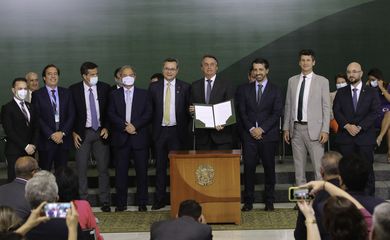Brazil to have green economy before other nations: Minister

Brazil’s Environment Minister Joaquim Leite said that the answer to climate issues assailing the world is the complete transition into what he termed green economy, which should be negotiated among all nations. This economy will have Brazil as an exponent by 2050—the year in which, as per the ministry’s plans, the country should reach zero greenhouse effect gas emissions.

“Brazil will seek consensus on relevant topics like climate financing. This problem must be recognized. Having found the solution, there is nothing better than green growth, a transition into a green economy, neuter in emissions by 2050, as is the Brazilian goal,” Joaquim Leite stated.
During a Wednesday (Oct. 27) interview, the minister confirmed the country will reach green economy before others and reiterated that Brazil “does take care of its forests.” “We’re home to the biggest biodiversity and to one of the world’s largest oceanic areas and native forests. These are competitive assets in the global market,” he added.
At COP 26, Joaquim Leite said, Brazil will unveil entrepreneurial and sustainable initiatives, in addition to exposing a number of real environmental solutions in such fields as industry, energy, rural production, agriculture, and tourism. These examples make up “the real Brazil,” Leite argued.
“We’ll seize the opportunity at COP26 to show to the whole world a Brazil that takes care of its forests, and yes, it is an economy low in greenhouse effect gas emissions with an energy network that’s everybody’s dream,” the minister went on to declare.
Carbon credits
To the judgment of the federal government, Brazil has great potential to export carbon credits. In this regard, the minister said the country has had a significant role in major markets generating carbon credits, like ethanol and cellulose, not to mention grain production.
“Brazil will be an exporter of carbon credits to the world, which still can’t slash emissions. Carbon credits are used when it’s economically unfeasible or physically impossible to reduce emissions. Our native forests and the restoration of forests can generate carbon credits. These are all credit-based methods that can be used,” he explained.
Green Growth Program
The program to be announced at COP26, Leite reported, is called Green Growth—a comprehensive initiative encompassing ten ministries. The goal is to have the participating bodies avail themselves of the sustainable growth agenda in all plans to be implemented by the federal government.
In practice, the minister pointed out, the green agenda will become one of the pillars for the execution of ministerial projects, and should serve as a norm on which to base the framework of public policies.
The minister further stated that Brazilian public banks have approximately $50 billion available to finance sustainable projects, an investment that may provide the funds to the transition into a green economy. “The private enterprise is totally in line with this transition,” he noted.
“We need to transform Brazil institutionally. [We need] to prioritize green projects. If we build a new economy, we’ll solve the problem of emissions in the world, making a contribution by doing our part,” Joaquim Leite affirmed.





